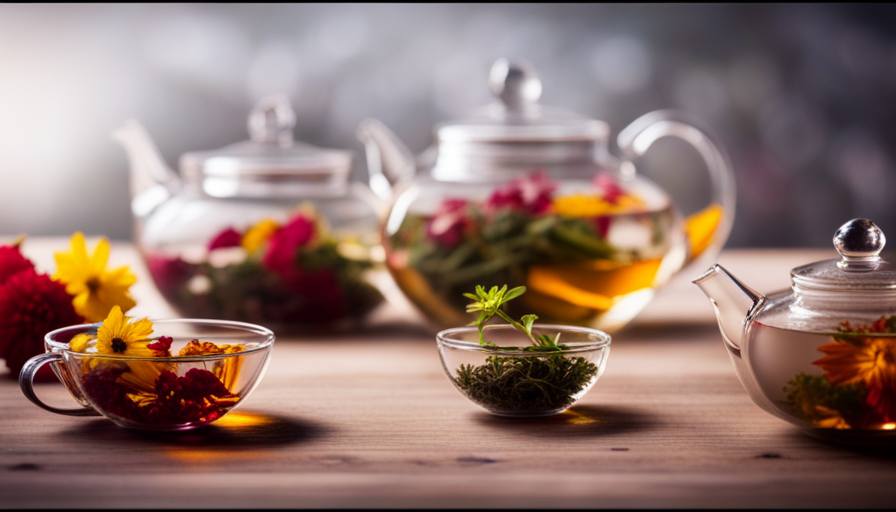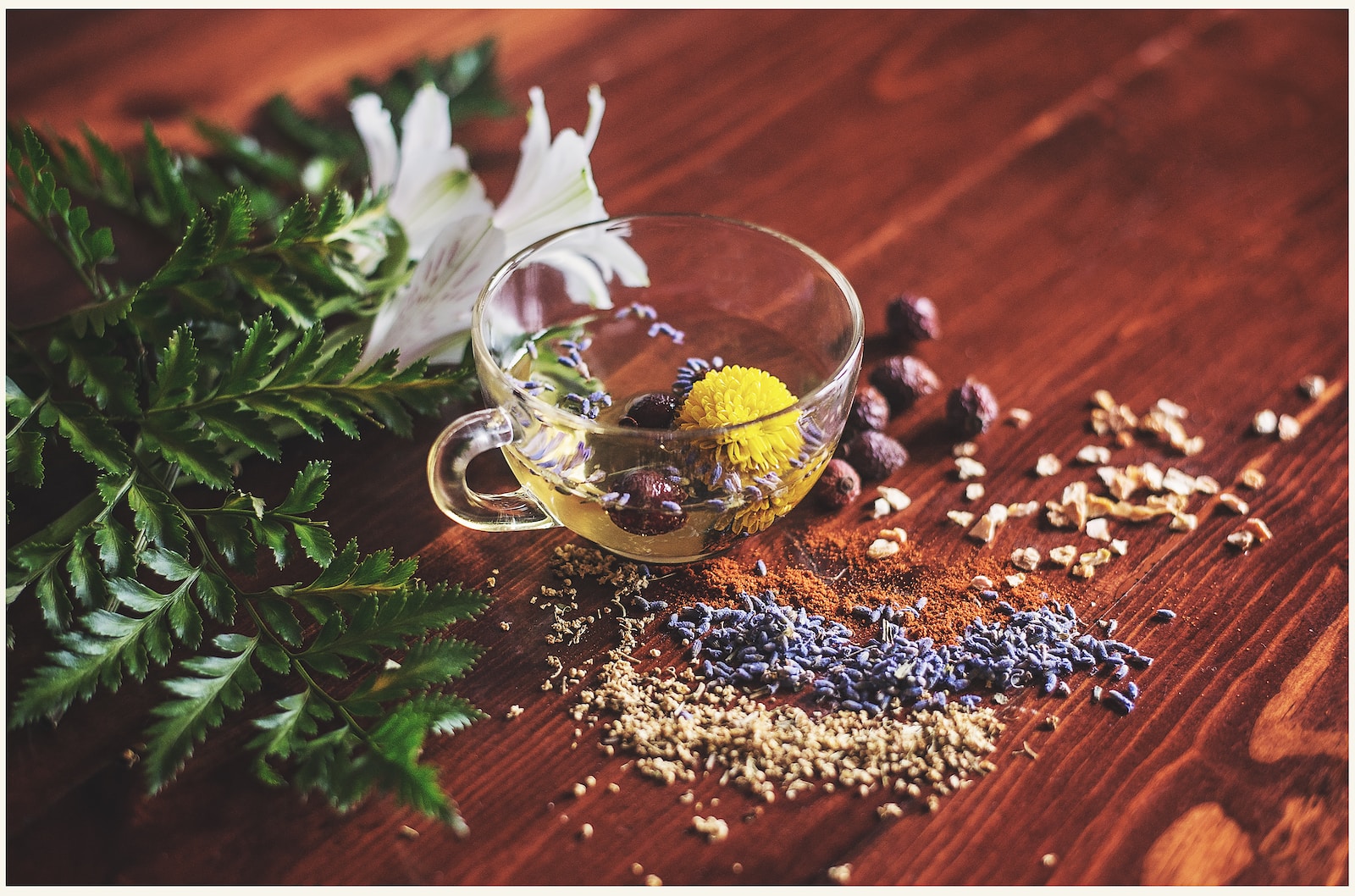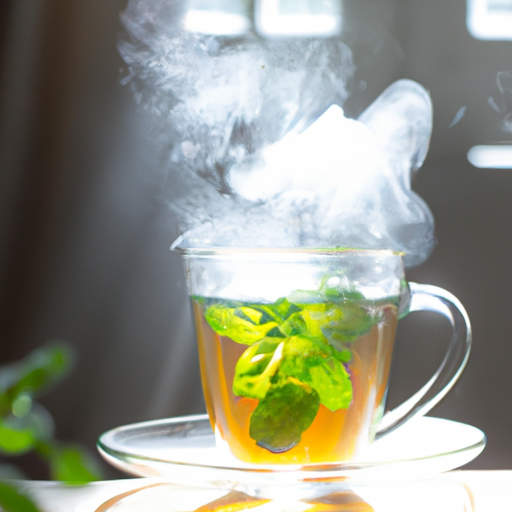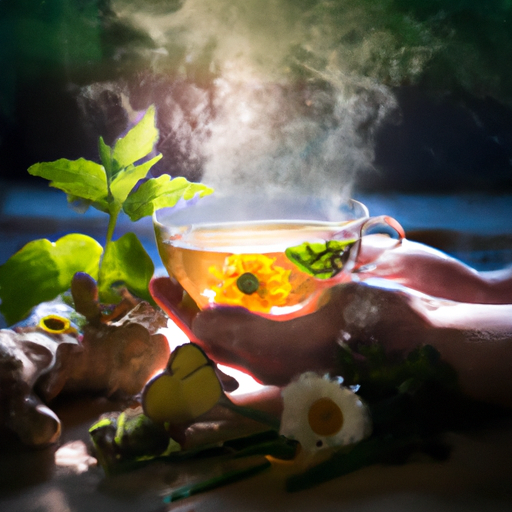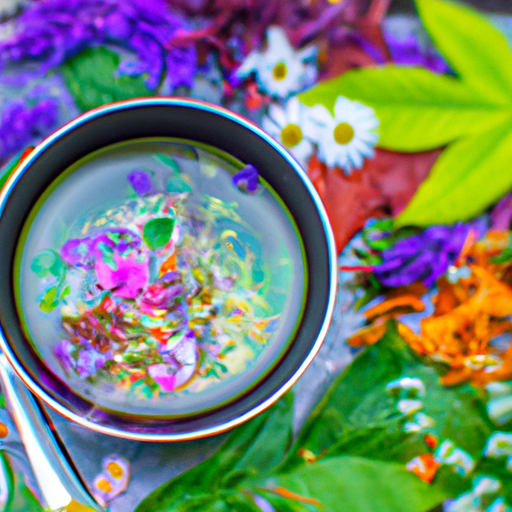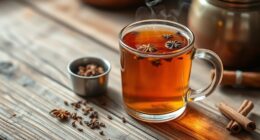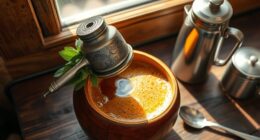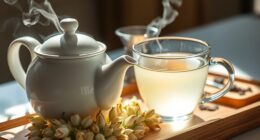Ever thought about what herbal tea is and how it’s different from regular tea?
Well, sit back, relax, and let me take you on a journey through the aromatic world of herbal tea. Like a soothing breeze on a warm summer day, herbal tea offers a refreshing and delightful experience for the senses.
Herbal tea, unlike traditional tea made from the Camellia sinensis plant, is crafted from various herbs, flowers, and fruits, resulting in a diverse range of flavors and health benefits. From chamomile to peppermint, each herb brings its unique essence and therapeutic properties to the cup.
In this article, we will delve into the origins of herbal tea, explore the different types of herbs used, and uncover the numerous health benefits that herbal tea can provide.
I will also guide you on how to brew the perfect cup of herbal tea and introduce you to specific herbal teas that can alleviate certain health conditions.
So, grab your favorite mug, and let’s embark on a flavorful journey into the world of herbal tea.
Key Takeaways
- Herbal tea is made from herbs, flowers, and fruits, not from the Camellia sinensis plant.
- Herbal tea has a wide range of flavors and health benefits.
- Herbal tea is caffeine-free, making it a good alternative for those sensitive to caffeine.
- Different types of herbal tea offer unique health benefits, such as promoting sleep, improving heart health, and boosting metabolism.
Origins of Herbal Tea
So, you’re probably wondering where herbal tea actually comes from. Well, let me enlighten you on the origins and cultural significance of this delightful beverage.
Herbal tea, also known as tisane, has been consumed for centuries across various cultures around the world. Its roots can be traced back to ancient civilizations like Egypt, China, and India, where it was used for its medicinal properties and believed to have healing effects on the body.
In different regions, herbal tea was prepared using a variety of plants, flowers, and herbs, each with its own traditional uses and folklore. For example, chamomile was recognized for its calming properties, while peppermint was used to soothe digestion. These traditional uses were passed down through generations, forming an integral part of their cultural heritage.
The cultural significance of herbal tea goes beyond its medicinal qualities. It has become a symbol of hospitality, comfort, and social bonding in many societies. Sharing a cup of herbal tea with friends and family is a common practice to relax and unwind.
Now, let’s move on to the difference between herbal tea and traditional tea without losing the essence of its origins and cultural significance.
Difference between Herbal Tea and Traditional Tea
Apart from the familiar tea made from leaves, there’s another kind of tea that derives its flavors and benefits from a variety of natural ingredients. This type of tea is known as herbal tea, and it’s distinct from traditional tea in a few key ways.
One of the main differences is the caffeine content. While traditional tea, such as black, green, or oolong tea, contains caffeine, herbal tea is naturally caffeine-free. This makes herbal tea a great alternative for those who are sensitive to caffeine or prefer to avoid it altogether.
In addition to being caffeine-free, herbal tea is also known for its potential natural remedies for sleep disorders. Certain herbs used in herbal tea, such as chamomile, lavender, and valerian root, have calming properties that can promote relaxation and improve sleep quality. These herbs have been used for centuries as natural sleep aids, and many people find them effective in helping them fall asleep faster and stay asleep longer.
Moving forward to the next section about ‘types of herbs used in herbal tea,’ it’s important to note that herbal tea can be made from a wide range of plants and botanicals. From popular herbs like peppermint and ginger to lesser-known ones like hibiscus and lemon balm, each herb brings its own unique flavor and potential health benefits to the tea.
Types of Herbs Used in Herbal Tea
To explore the diverse world of herbal infusions, you’ll find an array of herbs, ranging from the well-known peppermint and ginger to the lesser-known hibiscus and lemon balm, each offering distinctive flavors and potential health benefits.
There are various types of herbal tea, each made by infusing different herbs in hot water. Some popular types include chamomile tea, which is known for its calming properties, and lavender tea, which can help with relaxation and sleep.
Other common herbal teas include echinacea tea, which is believed to support the immune system, and rosehip tea, which is rich in vitamin C and antioxidants. Nettle tea is often consumed for its potential diuretic and anti-inflammatory effects, while dandelion tea can aid in digestion.
Each herb used in herbal tea has its own unique properties and potential health benefits, making it an exciting and flavorful alternative to traditional tea.
As we delve into the health benefits of herbal tea, you’ll discover how these natural infusions can contribute to your well-being.
Health Benefits of Herbal Tea
Did you know that drinking herbal infusions can have a positive impact on your health?nnHerbal tea, made from the infusion of various types of herbs, offers a wide range of health benefits. These benefits can vary depending on the types of herbs used in the tea.
One of the main health benefits of herbal tea is its ability to boost the immune system. Certain herbs, such as echinacea and ginger, contain properties that can help strengthen the body’s defense against infections and diseases.
Herbal teas can also aid in digestion, as herbs like peppermint and chamomile have been found to soothe the stomach and relieve indigestion. Additionally, herbal tea can promote relaxation and reduce stress, with herbs like lavender and lemon balm known for their calming effects.
Different types of herbs used in herbal tea offer unique health benefits. For example, chamomile tea is known for its ability to promote sleep and reduce anxiety, while green tea is rich in antioxidants that can help improve heart health and boost metabolism.
Now that you know about the health benefits of herbal tea, let’s move on to how to brew it without compromising its goodness.
How to Brew Herbal Tea
Brewing your own cup of herbal goodness will transport you to a world of soothing aromas and relaxation. Learning how to steep herbal tea properly is essential to unlock its full potential.
First, start by choosing high-quality herbal tea brands that use organic, pesticide-free ingredients. This ensures that you’re getting the best flavors and health benefits from your brew.
To steep herbal tea, begin by boiling water and pouring it over the tea bag or loose herbs in a teapot. Let it steep for about 5-7 minutes to allow the flavors and medicinal properties to infuse into the water. Remember, steeping time may vary depending on the type of herbal tea you’re brewing, so be sure to follow the instructions on the packaging or experiment to find your preferred strength.
Once the steeping time is up, remove the tea bag or strain the loose herbs from the water. Sip your freshly brewed herbal tea slowly, savoring each sip and allowing the calming effects to wash over you.
Now that you know how to brew herbal tea, it’s time to explore the world of popular herbal tea blends. These blends combine different herbs and botanicals to create unique flavors and health benefits. Let’s dive into the captivating world of herbal tea blends and discover the perfect cup for you.
Popular Herbal Tea Blends
Immerse yourself in a world of irresistible flavors and wellness with popular blends of herbal infusions. Herbal tea blends are a delightful way to enjoy the benefits of herbs while exploring a variety of flavors.
From soothing chamomile to invigorating peppermint, there’s a blend for every taste preference. One popular herbal tea blend is the classic chamomile and lavender combination. This calming blend is known for its relaxing properties and floral aroma.
Another favorite is the refreshing blend of peppermint and spearmint. This invigorating combination not only provides a burst of flavor but also aids in digestion.
For those who enjoy a hint of sweetness, a blend of hibiscus and rosehip is the perfect choice. This fruity infusion is not only delicious but also rich in antioxidants.
If you prefer a more earthy flavor, try a blend of nettle and dandelion. These herbs are known for their detoxifying properties and can support overall wellness.
Herbal tea blends offer a wide range of flavors and health benefits. From calming chamomile to invigorating peppermint, there’s a blend to suit every palate.
Transitioning into the next section about herbal tea for specific health conditions, let’s explore how these blends can be tailored to address individual wellness needs.
Herbal Tea for Specific Health Conditions
Indulge in the healing power of herbal infusions tailored to your specific health needs, from soothing chamomile for relaxation to invigorating peppermint for digestion. When it comes to herbal tea for insomnia, there are a few key options to consider.
One popular choice is valerian root tea, known for its sedative properties that help promote better sleep. Another option is passionflower tea, which has been used for centuries as a natural remedy for insomnia and anxiety. Both of these herbal teas can be a great addition to your nighttime routine, helping you unwind and prepare for a restful night’s sleep.
For those dealing with digestive issues, herbal tea can also offer relief. Peppermint tea is well-known for its ability to soothe an upset stomach and reduce symptoms of indigestion. Ginger tea is another excellent choice, as it can help relieve nausea and aid in digestion. These herbal teas can be enjoyed after a meal or at any time when you’re experiencing discomfort.
Transitioning into the subsequent section about herbal tea and traditional medicine, it’s fascinating to explore how herbal infusions have been used for centuries to support various health conditions.
Herbal Tea and Traditional Medicine
Surprisingly, herbal infusions have been regarded as a cornerstone of traditional medicine for centuries, offering valuable support for a wide range of health conditions. Herbal tea has played a significant role in traditional medicine practices around the world and continues to be used today.
It’s important to note that while herbal tea is often associated with natural remedies, it isn’t a substitute for modern medicine. However, herbal tea can complement and support conventional treatments in certain cases.
Herbal tea and modern medicine can work together to provide holistic care. Many herbs used in traditional medicine have been studied and found to have medicinal properties. For example, chamomile tea has been shown to have anti-inflammatory and calming effects, making it a popular choice for promoting relaxation and aiding digestion. Echinacea tea is often used to boost the immune system and reduce the duration of cold symptoms. These are just a few examples of how herbal tea can be used in conjunction with modern medicine.
Incorporating herbal tea as a natural remedy can provide a sense of comfort and well-being. It’s important to consult with a healthcare professional before incorporating herbal tea into your healthcare routine, especially if you have any underlying medical conditions or are taking medication. With proper guidance, herbal tea can be a valuable addition to your wellness routine.
Herbal tea, as a refreshing cold beverage, can be a delightful way to enjoy the benefits of herbs while staying hydrated.
Herbal Tea as a Refreshing Cold Beverage
Enjoying herbal infusions as a chilled beverage can be a delightful way to savor the refreshing benefits of natural remedies while staying hydrated. Not only do herbal teas provide a soothing and relaxing experience, but they also offer a range of flavors and health benefits. With a variety of herbal tea recipes available, you can easily create your own refreshing concoctions to suit your taste preferences and wellness needs.
To help you get started, here is a table showcasing three popular herbal tea recipes for relaxation:
| Recipe | Ingredients | Benefits |
|---|---|---|
| Chamomile and Lavender | Chamomile flowers, | Promotes relaxation and |
| lavender buds | aids in better sleep. | |
| Peppermint and Lemon | Peppermint leaves, | Relieves stress and anxiety, |
| lemon slices | aids digestion. | |
| Hibiscus and Rosehip | Hibiscus petals, | Rich in antioxidants, |
| rosehip berries | boosts immune system. |
Exploring the world of herbal tea: recommendations and resources can be an exciting journey to expand your knowledge and experience with herbal infusions. From herbal tea blends to specialized tea shops, there are plenty of options to discover and enjoy. So, let’s delve into the world of herbal tea and uncover the endless possibilities for relaxation and wellness.
Exploring the World of Herbal Tea: Recommendations and Resources
Embark on a captivating journey through the realm of herbal infusions, where an abundance of recommendations and resources await to enhance your relaxation and wellness experience.
When it comes to exploring herbal tea flavors, the possibilities are endless. From soothing chamomile to invigorating peppermint, there’s a flavor for every palate and mood.
For those seeking relaxation and stress relief, herbal tea is a perfect choice. Lavender tea, with its delicate floral notes, has been used for centuries to promote calmness and tranquility. The soothing properties of chamomile tea are well-known, making it a popular choice for winding down after a long day. If you’re looking for a refreshing and uplifting experience, try a citrus-infused herbal tea like lemon or orange. These zesty flavors not only awaken the senses but also provide a boost of vitamin C.
When it comes to discovering new herbal tea flavors and finding the perfect blend for relaxation, there are plenty of resources available. Online tea shops offer a wide range of options, allowing you to explore different flavors and read reviews from other tea enthusiasts. Additionally, local health food stores often have a selection of herbal teas, allowing you to sample and discover new flavors in person.
So, why not indulge in the world of herbal tea? With its vast array of flavors and its ability to promote relaxation and stress relief, it’s the perfect companion for a moment of tranquility in our busy lives. Cheers to a cup of herbal tea and a moment of bliss.
Frequently Asked Questions
Can herbal tea be consumed by pregnant women?
As an expert in herbal tea, I can confidently say that pregnant women should exercise caution when consuming herbal tea. While herbal tea is generally considered safe, certain herbs can have an impact on fetal development. It’s important to consult with a healthcare professional to ensure the safety of herbal tea during pregnancy.
Prioritizing the well-being of both mother and baby is crucial, and staying informed about the potential effects is always a wise choice.
Can herbal tea be used to treat anxiety and stress?
Yes, herbal tea can be used to treat anxiety and stress. It offers numerous benefits for relaxation and calming the mind. Some herbal teas that are known for their anxiety-reducing properties include chamomile, lavender, lemon balm, and passionflower. These teas contain natural compounds that promote relaxation and relieve tension.
To make herbal tea, you can try different recipes by infusing various herbs in hot water. Experiment with different combinations to find the one that works best for you.
Can herbal tea be consumed by children?
Like a warm hug on a chilly day, herbal tea can be a soothing beverage for children. It offers a range of benefits, from promoting relaxation to aiding digestion. With a variety of flavors like chamomile, peppermint, and lemon balm, there’s a tea to suit every little one’s taste buds. However, it’s important to choose caffeine-free options and consult with a pediatrician to ensure safety and appropriate dosage for your child.
Are there any side effects of drinking herbal tea?
There can be potential interactions with medications and possible allergic reactions when drinking herbal tea. It’s important to be aware of these side effects. Certain herbs used in herbal teas can interfere with the effectiveness of certain medications or cause adverse reactions.
Additionally, some individuals may have allergies to specific herbs, leading to allergic reactions when consuming herbal tea. It’s always best to consult with a healthcare professional before incorporating herbal teas into your routine, especially if you’re taking any medications.
Can herbal tea help with weight loss?
Herbal tea offers a range of benefits, including potential weight loss support. Certain herbal teas have properties that can help boost metabolism, suppress appetite, and promote fat burning. Some of the best herbal teas for weight loss include green tea, oolong tea, and peppermint tea. These teas are known for their thermogenic effects and ability to enhance the body’s natural fat-burning processes. Incorporating these teas into a balanced diet and exercise routine may aid in weight loss efforts.
Conclusion
In conclusion, herbal tea is truly a gift from nature. Its origins can be traced back to ancient civilizations, where it was revered for its medicinal properties. Today, herbal tea continues to be a popular choice for those seeking a natural and refreshing beverage.
With a wide variety of herbs to choose from, each with its own unique benefits, there’s a herbal tea for every palate and health need. So why not indulge in a cup of herbal tea and let its soothing warmth envelop your senses? It’s a delightful way to nourish your body and uplift your spirit.

